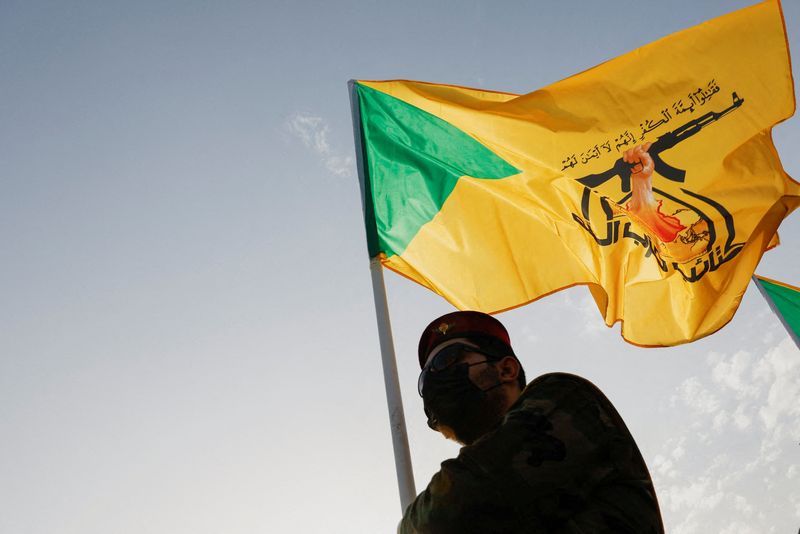By Ahmed Rasheed and Timour Azhari
BAGHDAD (Reuters) -Nervously watching Israel's destructive campaigns in Gaza and Lebanon, Iraq is working to avoid being drawn into the growing regional conflict as Iran-backed armed groups launch attacks on Israel from Iraqi soil, sources familiar with the matter say.
Two decades after the U.S.-led invasion that toppled Saddam Hussein, Iraq is experiencing relative stability with high revenue from oil sales funding a service-based agenda that has turned much of the country into a construction site.
Iraq does not have diplomatic relations with Israel and Prime Minister Mohammed Shia al-Sudani's government is wary of regional conflicts that could affect its delicate balancing act between Washington and Tehran, both states it is allied with.
Axios reported late on Thursday that Israeli intelligence suggests Iran is preparing to attack Israel from Iraqi territory in the coming days, possibly before the U.S. presidential election on Nov. 5, citing two unidentified Israeli sources.
There was no immediate Iraqi comment.
Spillover from regional conflict has already resulted in months of tit-for-tat attacks between Iran-backed armed groups and U.S. forces stationed in Iraq and the region that only subsided after Iran intervened in February.
Sudani's government has not been successful in a push to convince the Islamic Resistance in Iraq - a coalition of Iran-backed armed groups - to stop firing rockets and drones at Israel, according to four sources in Iran-backed armed groups and two government advisors.
Two visits to Iran by Iraq's top security officials in the past two months, seeking Tehran's help to rein in its allied Iraqi factions, failed, the sources said.
"The Iraqi delegation received a cold reception in Tehran ... The answer was: those groups have their own decision and it is their call to decide how to support their brothers in Lebanon and Gaza," said a senior Iraqi security official briefed on the visits.
Baghdad turned to Washington, asking U.S. officials to intervene with Israel to prevent retaliation for the attacks, including one that killed two Israeli soldiers and wounded more than 20 on Oct. 4, the sources said, the first time such an attack has been reported to cause fatalities.
"Washington was understanding of the repercussions of possible Israeli strikes in Iraq and pledged to help," said an Iraqi foreign ministry official.
A spokesperson for the U.S. embassy in Baghdad did not immediately respond to a request for comment.
Four militia sources said the Kataib Hezbollah and Nujaba groups, which are leading the attacks on Israel, have warned the prime minister against pressuring them to halt their actions and vowed to continue their attacks as long as Israel continued its Gaza and Lebanon operations.
The issue has divided parties in Iraq's ruling coalition, all of whom are sympathetic to the Palestinian cause and view Israel as an enemy, though some differ over how involved Iraq should be in the regional confrontation.
Shi'ite leaders discussed the risk of repercussions from attacks on Israel and possible Israeli retaliation during two meetings in October, said Ahmed Kenani, a Shi'ite lawmaker from the ruling alliance.
Key players in the Shi'ite coalition view direct confrontation with Israel as counterproductive and potentially damaging to Iraq, according to four Shi'ite lawmakers.
"Those groups who have the rockets and drones should go to Gaza and Lebanon to fight Israel rather than pushing Iraq towards destruction," said Iraqi PM adviser Abdul Ameer Thuaiban.
Kataib Hezbollah, the most powerful of the armed factions, said Israel and the U.S. would have to pay a price for Israel's strikes on Iran last week.
Senior Iraqi security sources told Reuters ahead of that attack that any strike by Israel against Iran outside what the sources called the established rules of engagement could prompt pro-Iran armed groups to significantly expand their attacks on Israel and U.S. assets in the region.
Mohammed Shummary, chairman of Baghdad-based think tank the Sumeria Foundation, said growing regional conflict risked pulling Iraq's Shi'ite Muslim parties, many of them heavily armed, into a confrontation that few initially had appetite for.

"They are torn between maintaining their decision to keep Iraq out of the confrontation and their ideological and political commitments toward the Shia of Lebanon and the broader resistance axis, amid Israeli aggression that has crossed all permissible red lines," he told Reuters.
"If the confrontation escalates ... this may not only mean the continuation of attacks on Israeli targets but also the potential involvement of additional factions in larger, more complex operations," he said.